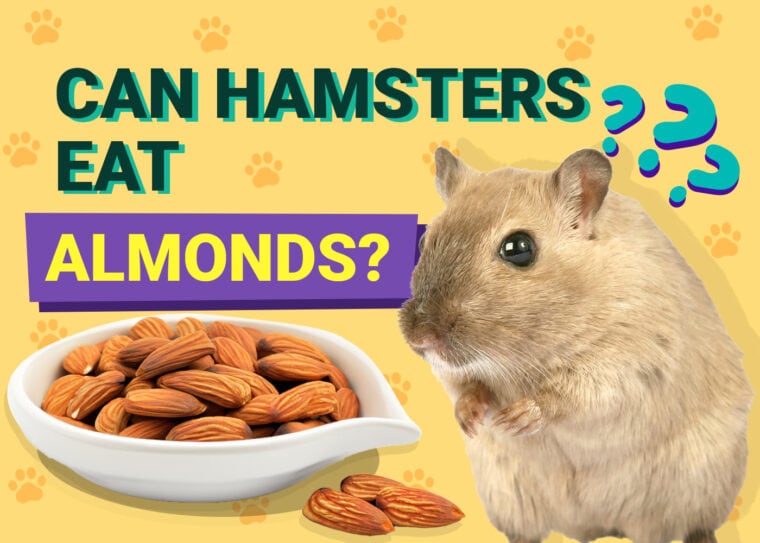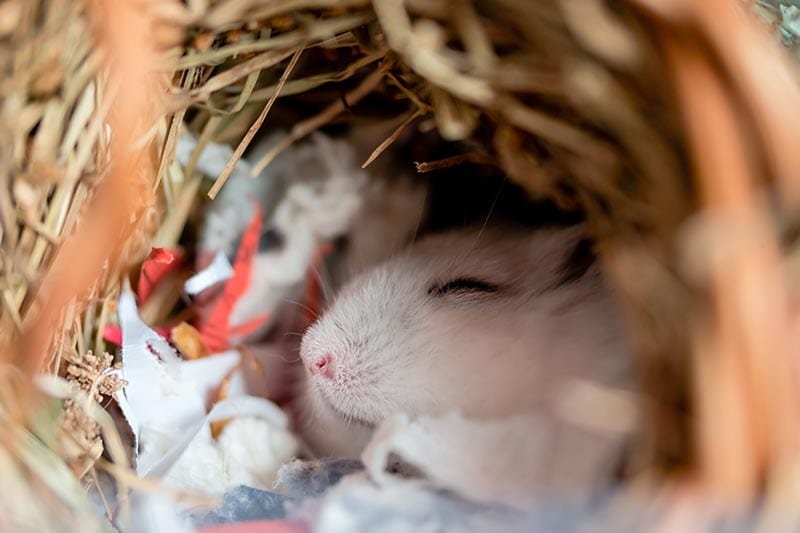
Your hamster loves his seeds and nuts, and almonds are known to be a healthy and nutritious snack for humans. But are almonds safe for hamsters to eat?
Can hamsters eat almonds? The short answer is yes, but with some serious warnings. Sweet almonds are generally safe for your hamster, but bitter and salted almonds need to be avoided. We’ll discuss what to look out for and how much is okay, but almonds can be just as tasty and healthy of a snack for hamsters as it is for us.

A Hamster’s Diet
Did you know that the hamster got his name from the German word “hamstern,” which means “to hoard”? These little guys were well named, given their habit of stuffing their cheek pouches full of food.
Hamsters are native to Romania, Greece, and northern China, but they were originally discovered in Syria, and in 1936, they were brought to North America. The hamster lives in warm and dry areas such as sand dunes, savannas, and the outskirts of deserts.
Hamsters are omnivores and eat various seeds, grains, nuts, insects, vegetables, and fruit. The domestic hamster typically has its nutritional needs met with commercially made pellets specially designed for hamsters. They also eat an assortment of seeds in combination with small amounts of fruit, vegetables, and herbs.
So, we’ve established that nuts do fit into a typical hamster diet, but let’s have a closer look at almonds since that’s what we’re here for.

All About Almonds
Did you know that almonds are grown on trees and are related to peaches and apricots, and they are 100% dependent on honeybees to grow? While the peanut is the most popular nut in the world (peanut butter, anyone?), the almond is the second most popular and definitely the healthier option.
One ounce of almonds contains 3.5 g of fiber, 6 g of protein, vitamins E, B2, copper, manganese, magnesium, antioxidants, and phosphorus.
Almond Benefits
Almonds are considered the healthiest nut out there, but are they safe and healthy for your hammy?
Almonds and Hamsters
The good news is, if you give your hamster the right kind of almonds, they will experience similar health benefits that we humans do.
Clearly, almonds are amazing little nuts that can be an incredible health boost for people and hamsters alike. But what are the negatives?

The Downside for Hamsters
Unfortunately, almonds do have a negative side for hamsters. We’ll have a look at what kind of almonds you need to avoid and why.
Salted Almonds
Some almonds come salted or with added flavoring and additives, and while they are okay for people to eat (in moderation), they are definitely not good for your hamster. Too much salt can cause upset stomach, diarrhea, and dehydration for your hammy. Only give your hamster plain almonds with no added ingredients.
Bitter Almonds
Avoid! Bitter almonds have a natural toxin that breaks down into cyanide by the body when it’s ingested. Cyanide is a deadly poison, and while you would need to eat 6 to 10 bitter almonds to feel the effects (50 bitter almonds can cause death for the average person), the hamster is tiny, and it wouldn’t take much for him to fall seriously ill or die.
Fat Content
Almonds contain a large amount of healthy fat, but this could still prove to be too much fat for your hammy if you give him almonds on a regular basis. Obviously, this can lead to obesity, which will prove damaging for your hammy’s overall health.
Choking Hazard
The smaller your hamster, the larger the chance that the almond could prove to be a choking hazard. Particularly if you’re giving your hamster almonds that are still in the shell. Consider cutting the almonds down in size before giving them to your hamster and keep an eye on him while he’s eating, especially if it’s a treat you haven’t given your hamster before.

Almond Guide
If you’ve decided that you would like to start giving your hamster almonds, here are some tips for the purchasing and preparation of this delicious nut.

Summary
After all of this information, the conclusion is that a moderate number of sweet almonds will be a safe and healthy snack for your hammy. Just follow the guidelines above and ensure any almonds you give your hamster are not bitter almonds and don’t have any kind of flavoring or salt. Plain, organic almonds are best, and if you remove the skin, you are ensuring the safest treat.
If you are worried that your hamster isn’t feeling well after eating an almond, contact your vet as soon as possible. The health and safety of your little guy is of the utmost importance, and as long as you follow advice, adding almonds to your hamster’s diet may just give his health the boost he needs. Plus, he’ll enjoy a tasty new treat.








